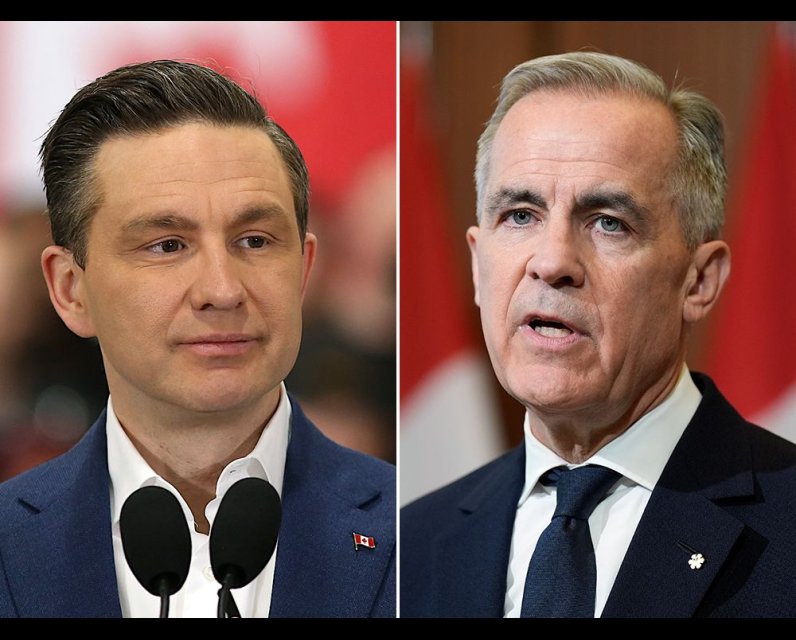Source Feed: National Post
Author: Ainsley Krienselokker
Publication Date: April 21, 2025 - 12:01
Liberals and Conservatives fighting for support from centrist voters, poll shows
April 21, 2025

A survey taken earlier this month suggests that the Liberals are drawing significant support from the ideological centre, have eroded the NDP’s base and is even encroaching on traditionally Conservative territory — a trend that could shape the outcome of the 2025 federal election.
The poll conducted by Leger for the Association for Canadian Studies found that the Liberals had secured about two thirds of voters who identify as left or left-of-centre. The NDP had 20 per cent support from those on the left and only eight per cent from those who identify as left of centre. The Liberals were also leading the Conservatives by 10 percentage points among those who place themselves in the ideological centre.
The survey found that 28 per cent of respondents identify as left or left of centre, 25 per cent in the centre and 23 per cent as right or right of centre. Another 25 per cent said they don’t know or prefer not to answer.
“The ideological spread has been fairly consistent over time,” said Jack Jedwab, president of the Association for Canadian Studies and the Metropolis Institute. “From an electoral standpoint, the seven in ten Canadians who identify somewhere in the centre (left of centre, centre or right of centre) remain critical — they’re the ones most likely to reconsider their vote.”
The poll suggests the Liberals have found traction among voters across the spectrum. Notably, they’ve secured support from 23 per cent of those identifying as right of centre and nine per cent of those on the right.
The Conservatives, led by Pierre Poilievre, dominate among right-leaning voters (82 per cent support from those on the right and 71 per cent from those who are right of centre), but they face hurdles in expanding beyond that base. “To make essential gains, the Conservatives must strengthen their support in the centre and regain right of centre voters drifting to the Liberals,” Jedwab said.
The survey found that 46 per cent of voters in the centre support the Liberals, compared to 35 per cent for the Conservatives.
The Conservatives “need to convince centrist voters that Carney lacks leadership strength,” he said.
“There’s a widespread sense that the stakes in this election are high,” Jedwab said. “Voters are focused on which leader is best positioned to address national challenges, including Canada’s relationship with the United States.”
The four major leaders were asked about how they would handle U.S. President Donald Trump and the trade war in the French and English debates last week. It remains to be seen if Poilievre was able to gain support from the centre and left of centre during the debates.
For the NDP, the outlook is more challenging. The Liberals’ surge has captured the NDP’s traditional base, and the party has struggled to make its core issues central to the national conversation.
“Progressive voters aren’t seeing their priorities — like social justice and equity — reflected in the current campaign,” Jedwab said. “The NDP hasn’t been able to insert those issues effectively.”
Regional dynamics may further shape party fortunes. British Columbians are the most likely to identify on the left or left of centre (39 per cent), while people living in Alberta, Manitoba and Saskatchewan are more likely lean to the right or right of centre (33 per cent). While 28 per cent of people in Alberta said they lean to the left, only 18 per cent in B.C. said they lean to the right.
Still, Angus Reid polling released on April 14 projects a virtual two-way tie in B.C., with the Liberals and Conservatives at 42 per cent each, the NDP at 11 per cent and the Greens at just three per cent. In Metro Vancouver, the Liberals under leader Mark Carney hold the lead with 49 per cent of voter intention, though both the Conservatives and NDP have chipped away at that lead according to the Angus Reid poll.
Both Poilievre and NDP Leader Jagmeet Singh addressed Canadians’ cost-of-living concerns at campaign events in B.C. on Sunday. Singh was in Victoria and Poilievre visited Surrey.
Election day is April 28.
The Leger survey of 1,631 Canadians was conducted online by Leger on April 5 and 6. A margin of error cannot be associated with a non-probability sample in a panel survey for comparison purposes. A probability sample of 1,631 respondents would have a margin of error of plus or minus 2.5 per cent, 19 times out of 20.
National Post, with additional reporting from The Canadian Press
May 19, 2025 - 23:17 | | CBC News - Canada
On Oct. 1, 2022, Michael McLeod walked a Hockey Canada investigator through his version of what happened on the night that he and some of his teammates are alleged to have sexually assaulted a woman at a downtown hotel in London, Ont., four years earlier.The investigator, a Toronto lawyer named Danielle Robitaille, asked him questions about when he first met the complainant – a woman known only as E.M. because of a publication ban – at a bar called Jack’s.
May 19, 2025 - 22:10 | Colin Freeze, Robyn Doolittle | The Globe and Mail
The Ottawa Charge will do everything it can to make sure Tereza Vanisova is back with the team next season. Read More
May 19, 2025 - 21:49 | Don Brennan | Ottawa Citizen



Comments
Be the first to comment